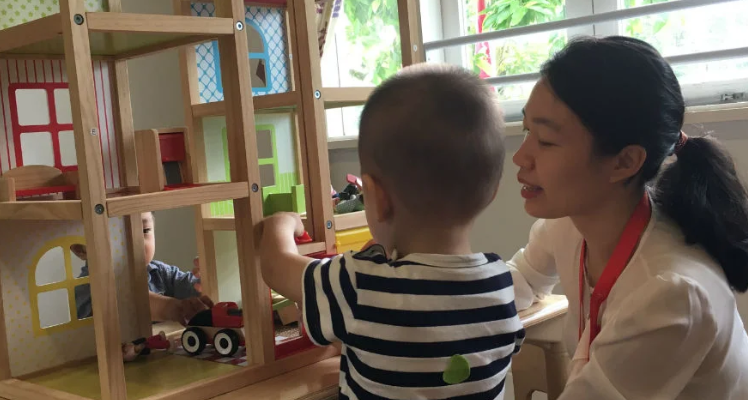
Children with added learning needs are quickly growing in number in Singapore. According to the Ministry of Education, the number of children with added needs in mainstream schools has doubled from about 5,000 to 10,000 in the last five years alone.
What’s more, in 2016, 2,170 children under the age of 4, or about 1.4% of the group, were diagnosed with varying degrees of developmental issues and needs.
As the spectrum of learning needs increase, it is clear that added needs in children are more common than we think.
Common Developmental Delays

The formative years from 3 to 6 are an important time for children. They are an especially crucial period for parents to observe how their child plays, speaks, walks, or interacts with others. Without keen observation, parents might overlook key signs that their child needs special attention for additional learning needs.
Common early indicators for autism spectrum disorder (ASD) can include:
– avoiding eye contact
– delayed speech development
– not responding to his or her name or to the sound of a familiar voice
– making repetitive movements, such as flapping their hands, rocking back and forth
and flicking their fingers
Some signs of attention deficit hyperactivity disorder (ADHD) are:
– consistent interruptions during conversations
– being unable to wait for their turn
– fidgeting
– a general lack of focus
Identifying and addressing these signs during a child’s formative years will greatly improve his or her learning journey.
How Early Intervention Benefits Both the Child and the Parents

Early intervention is about introducing the right kind of interventions in a child’s life as early as possible — when the child's mind is the most receptive to learning new things — to help the child become a successful learner. It involves working closely with children and families. And this can involve special education, therapy, counselling, service planning, and assistance in finding general services like kindergarten and child care.
Rather than simply “waiting it out” and treating problems later, early diagnosis and treatment for developmental delays increase the chances of improvement. For example, treating communication and language difficulties early on can prevent potential problems with behavior, learning, reading, and social interaction.
Here are three key factors to look out for in an effective early intervention program that can make a difference for your child:
1. Collaborative Involvement: Educators, Professionals and Parents Working Together as a Team
Every parent wants the best for their child, but may not know how to go about nurturing their potential, and this is especially true if your child needs a little more help than others. The process of seeking help can be nerve-wracking when done on your own.
Through early intervention, you can find strong support from specialists who provide a platform for parents to learn more about their child’s developmental needs and how to overcome them.
For example, Bright Path Inclusive Preschool works closely with parents, educators, and a team of specialists that includes occupational and speech therapists, and psychologists to develop each child’s learning plan and to holistically look after all your child’s developmental needs.
A tripartite partnership between family and professionals help to facilitate your child in achieving learning goals consistently in school or at home.
2. Customized programs for Every Child to Achieve Full Potential

Early intervention works best when it’s specific to your child’s individual needs. For this, you will need comprehensive and frequent assessments, which help to identify what added needs your child has, guide the creation of a comprehensive program adaptable in both at home and school, as well as ensure that early intervention helps achieve set milestones along their early learning journey.
To provide equal, customized opportunities for each child’s growth, Bright Path crafts Individualized Education Plans based on each child’s abilities and distinctive needs upon enrollment to guide their learning journey. These customized plans are delivered through a small teacher to child ratio at 1:3 to ensure that every child receives all the help required for his or her growth.
3. Integrated Early Intervention
If you are a working professional, you may fret over the care of your child while you’re at work, or have to make special arrangements to accompany your child to therapy sessions. Here, it is important to seek out an early childhood education provider who can offer a one-stop early intervention program for your child.
Bright Path is one of the first few all-inclusive preschools that provides full-time day care. It incorporates early intervention and professional therapy into the base preschool curriculum, reducing the need for parents to interrupt their work.
An in-house therapist is present with an educator during lessons for individual and immediate intervention, be it therapy, consultations or lessons. Integrated early intervention will hence ensure a consistent and holistic development program for your child.
The resources that early intervention unlocks are truly an invaluable enhancement to every parent to give the best for their child as a unique individual and future leader.
Where Help Can be Found in Singapore

As part of its drive to become a more wholly inclusive society, Singapore has a robust framework to support families and children with added needs, as part of the Enabling Masterplan. This includes channeling a substantial amount of funding through various government subsidies and funds to ensure both mainstream and special education are kept accessible and affordable for children who need it.
Additionally, early intervention services in the community are provided through the Ministry of Social and Family Development-funded Early Intervention Programme for Infants and Children (EIPIC) and Development Support program for children with milder needs in preschools. Subsidies from both Early Childhood Development Agency and MSF are also available for inclusive preschools, including Bright Path.
What Experts Say
On November 24, 2018, Bright Path Inclusive Preschool held an Open House together with a panel of experts. These experts shared their thoughts on the challenges children face during their formative years, and about how early intervention makes a difference in empowering children to overcome any developmental differences and delays.
One Parent’s Journey

One parent of a child with added needs enrolled in Bright Path Inclusive Preschool, Titis, shared the story of her journey with the school. She urged fellow parents to seek advice from professionals if they are concerned about any seemingly atypical developmental needs.
These professionals can help guide parents to understand and make a change for your child — all while including early childhood educators, intervention specialists, and psychologists. Titis shared that she noticed a marked improvement in her child’s communication and self-expression after enrolling him in the integrated early intervention program at Bright Path.
The Importance of Early Diagnosis

According to Associate Psychologist Tricia Tam, an early diagnosis for your child is important so any atypical development can be nipped in the bud. She also emphasized how early intervention with a tailored approach, rather than a “one-size-fits-all” one makes a huge difference in your child’s development.
Christina Teh, Ngee Ann Polytechnic Early Childhood Education lecturer agreed. She added that a child’s holistic development is important as well. An inclusive environment will support the child in developing to his full potential as a unique individual.
Most of all, experts shared a unanimous view that there will always be support for parents with a school like Bright Path. They are never alone in their journey towards bringing up their children, regardless of needs.
This article was republished with permission from theAsianParent.
theAsianparent is a publication under Tickled Media Pte Ltd. Started in September 2009, it is the largest parenting website in Southeast Asia, targeted at urban parents and parents-to-be who live in Asia or are of Asian heritage. theAsianparent speaks to every stage and priority of an Asian mom’s journey – from pre-conception to pregnancy, to breastfeeding, and even how to raise smart, strong and kind children.




